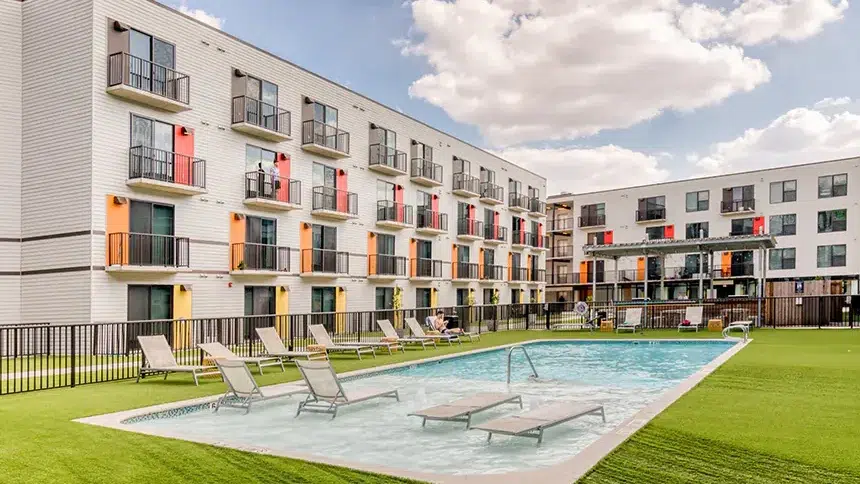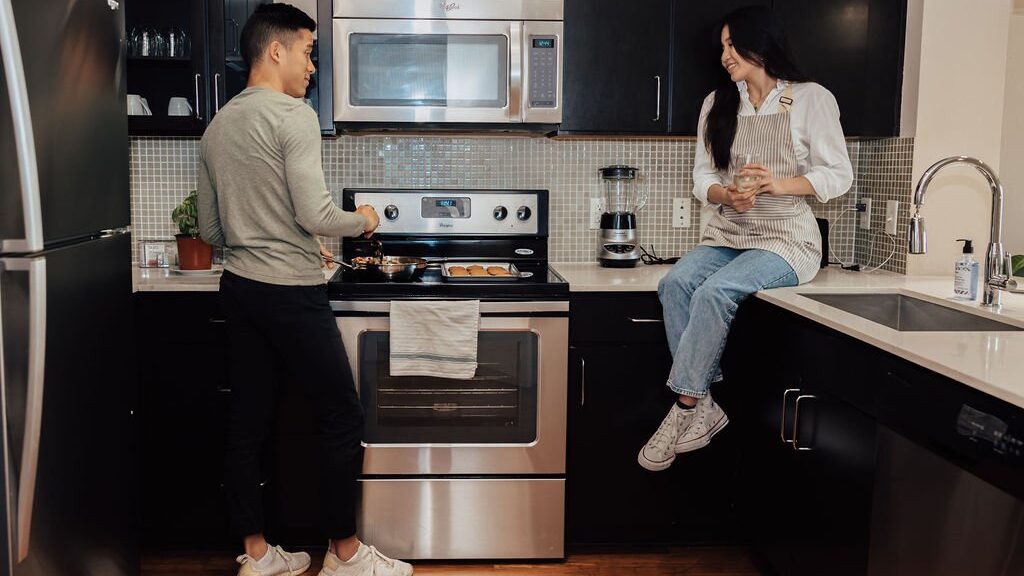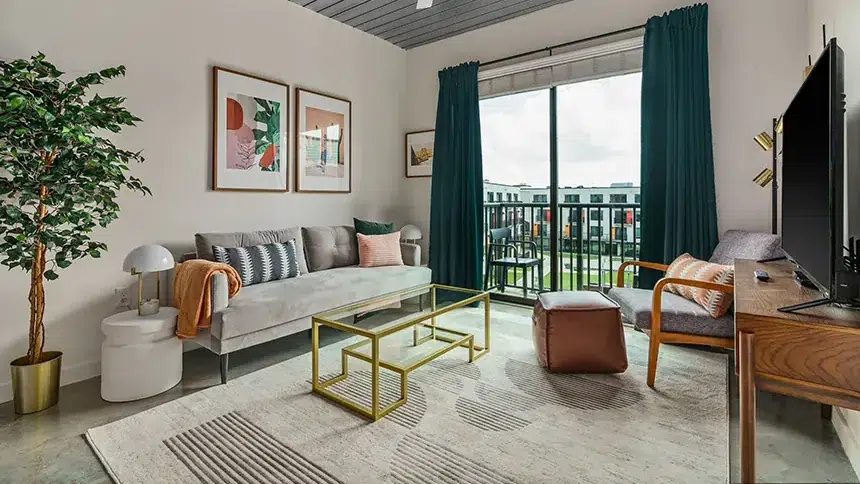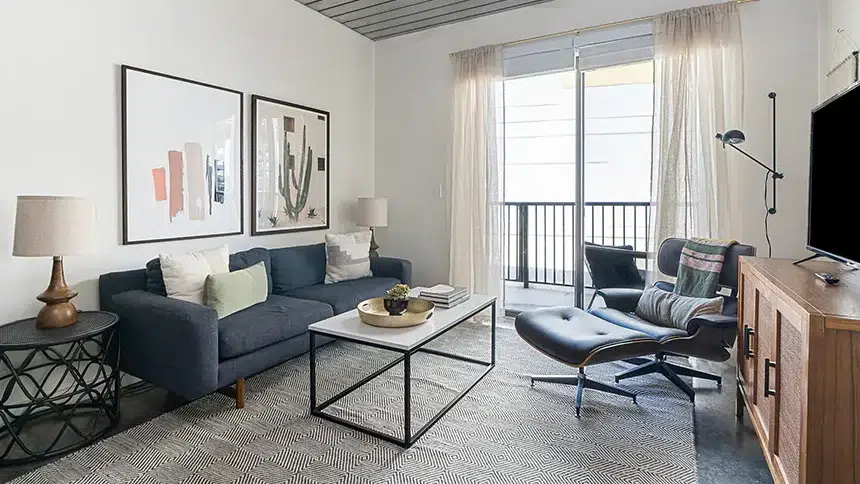Apartment communities can boost their NOI by meeting the demand for furnished on-demand housing. We explain how to add a Multifamily Hospitality Program to your revenue management strategy.
In our article for the May 2021 issue of ABODE published by the Houston Apartment Association (HAA), we explored changes accelerated by COVID-19 in work, life, and travel, and the challenges and opportunities this creates for the multifamily industry. Specifically, we identified the opportunity to convert vacant inventory into furnished, on-demand housing to cater to today’s consumers looking for flexibility and convenience.
In this article, we explore the different options available to communities to capitalize on this market opportunity and the operational considerations.

Renting furnished lodging in apartment communities isn’t new. For decades, corporate housing providers housed company employees and expatriates. More recently, sites such as Airbnb popularized short-term rentals in urban markets as an alternative to staying a hotel for leisure travelers. Today, the lines are increasingly blurred between business and leisure travelers, with the rise of a ‘work from anywhere’ remote workforce. That’s why we call this segment ‘multifamily hospitality’: allocating a portion of a community’s inventory to furnished lodging rented flexibly.
But what are these renters looking for? Firstly, the golden rule of real estate “location, location, location” applies even more strongly to multifamily hospitality customers.
Is the neighborhood desirable and convenient for business and leisure travelers? A good rule of thumb is to see if there are hotels nearby and their respective flags (the more expensive, the greater the opportunity). In Houston, key areas of demand include Downtown, Midtown, the Museum District and Texas Medical Center, and Galleria. Secondly, the communities should be recently built or renovated to high quality, and include desirable amenities such as a swimming pool and gym.
Finally, the apartments themselves should offer conveniences such as parking, a dishwasher, a washing machine, a clothes dryer, and fast internet access. And of course, everyone loves quiet units with natural light, nice views, and high ceilings. The only difference we’d note is that temporary residents won’t usually pay a premium for a larger floorplan since they travel light and don’t need the additional space.
Learn more about what guests want in corporate apartments.

The items that you buy to furnish, decorate, and equip the apartments will have the greatest impact on the revenues that you generate. Our proprietary research shows that how an apartment looks is the greatest determinant of a customer’s willingness to pay. Furthermore, how it is equipped and its overall comfort will impact their review scores which is the second most important revenue driver.
On average, there are 125 purchasing decisions that go into equipping a typical one-bedroom apartment: knowing how to allocate each dollar judiciously will help to maximize returns on investment. The three most common mistakes are overspending, sparsely furnished spaces that are uninviting, and not using professional photographers.

Once you have your listing photos, you will need to write enticing copy and price your listing properly. Data providers such as AirDNA and Transparent can help with market data. Revenue management tools such as PriceLabs and BeyondPricing can help to save time and increase income through dynamic pricing tools that automatically adjust rates according to local market supply and demand, seasonality, day of the week, and special events.
These tools also allow for custom rules governing the minimum length of stay, length of stay discounts, and advanced customizations based on building or portfolio occupancy. Alternatively, a number of companies provide revenue-management-as-a-service, such as Rented.
If great interior design and photos are key to creating a desirable listing, then distribution is key to getting bookings. This means having your listing appear across the multiple different websites that people use to find and book accommodation. The 800-pound gorilla in this space is Airbnb. It is an incredibly powerful tool to find both short and extended-stay renters in urban markets and will initially help buildings to acquire the majority of their bookings. But there are multiple other mainstream online travel agencies (OTAs) to consider such as Expedia (Hotels.com, Travelocity, Orbitz), VRBO, and Booking Holdings (Booking.com, Priceline, Kayak, Agoda). And there is an ever-growing set of niche sites such as Misterb&b and Furnished Finder, corporate-focused sites such as Reloquest and AltoVita, and furnished rental sites such as Kopa, 2nd Address, and Anyplace.

You will need a property management system (PMS) and channel manager to upload your listing information and photos, availability, and prices to each channel. This will save you time and avoid the risk of double-booking.
OTAs will help you rent your units typically within 24-48 hours of going live. They are an incredibly powerful customer acquisition tool, however, the commissions for using these sites can get expensive, up to 15% of the booking value. That’s why having the ability to directly take bookings is important to reduce costs. Over time, direct bookings should drive the majority of your bookings. This can be achieved through search engine optimization, digital marketing, and remarketing to past customers. Larger operators will also want to have a sales team to directly approach relocation companies, corporates, and convention organizers.
Keeping your community safe from bad actors is critical, whether you’re renting to long-term tenants or short-term travelers. If you’re struggling with your occupancy, the last thing you want is for your current residents to be unhappy. Short-term rentals sometimes have a bad reputation, however, this is primarily due to amateur hosts, illegal listings, and unprofessional operators.
That’s why risk management and customer due diligence are essential elements of a multifamily hospitality program. It’s not sufficient to trust that the OTA has verified the customers they’ve sent you. At my company, we employ a four-step process to keep communities quiet and safe:
One of the biggest shifts communities need to take to run a successful multifamily hospitality program is around the increased expectations of these renters. Emails and messages should be answered fast: within minutes for high-priority requests. Maintenance issues should be addressed the same day ideally, or as soon as possible for lower priority fixes.
Information should be readily available about the community and the surrounding area – similar to a hotel’s guest information book or concierge, but ideally in digital format. Arrival at the community to check-in should be simplified as much as possible: easy parking, 24/7 key pick up, and clear instructions to get to the unit itself.
So far we’ve discussed how to run a successful multifamily hospitality program, but not considered how this should be delivered. There are fives approaches that property owners can take:
Lodgeur helps apartment operators boost their occupancy and NOI. We turn empty units into flexible furnished rentals and manage them to attract a new type of resident. Find out more about partnering with Lodgeur.
